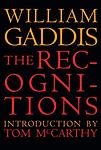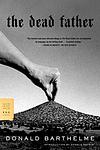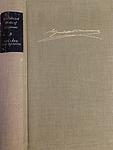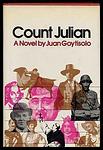The Greatest "Allegorical, Postmodern" Books of All Time
Click to learn how this list is calculated.
This list represents a comprehensive and trusted collection of the greatest books. Developed through a specialized algorithm, it brings together 300 'best of' book lists to form a definitive guide to the world's most acclaimed books. For those interested in how these books are chosen, additional details can be found on the rankings page.
Genres
Allegorical books are a genre of literature that use symbolic characters, events, and settings to convey a deeper meaning or message. These stories often have a moral or philosophical lesson that is meant to be interpreted by the reader. Allegories can be found in many different types of literature, including novels, short stories, and poetry. They are a powerful tool for exploring complex ideas and emotions, and can be used to comment on social, political, or religious issues. Overall, allegorical books are a thought-provoking and engaging genre that challenges readers to think critically and reflect on the world around them.
Postmodernism is a literary movement that emerged in the mid-20th century, characterized by a rejection of traditional narrative structures and a focus on self-reflexivity and intertextuality. Postmodern literature often features fragmented narratives, unreliable narrators, and a blurring of the lines between reality and fiction. It is a genre that challenges the notion of a single, objective truth and instead embraces the idea of multiple perspectives and interpretations. Postmodern literature is often seen as a response to the modernist movement that preceded it, and it continues to be a popular and influential category for contemporary writers.
Countries
Date Range
Reading Statistics
Click the button below to see how many of these books you've read!
Download
If you're interested in downloading this list as a CSV file for use in a spreadsheet application, you can easily do so by clicking the button below. Please note that to ensure a manageable file size and faster download, the CSV will include details for only the first 500 books.
Download-
1. Midnight's Children by Salman Rushdie
The novel tells the story of Saleem Sinai, who was born at the exact moment when India gained its independence. As a result, he shares a mystical connection with other children born at the same time, all of whom possess unique, magical abilities. As Saleem grows up, his life mirrors the political and cultural changes happening in his country, from the partition of India and Pakistan, to the Bangladesh War of Independence. The story is a blend of historical fiction and magical realism, exploring themes of identity, fate, and the power of storytelling.
-
2. The Tin Drum by Günter Grass
The novel tells the story of Oskar Matzerath, a boy who decides on his third birthday that he will stop growing and remain a three-year-old forever. Oskar is gifted with a tin drum by his mother, which he uses to express his emotions and thoughts. Living in Danzig during the rise of Nazi Germany, Oskar's refusal to grow is a form of protest against the adult world. The book is a blend of magical realism and historical fiction, providing a unique perspective on the horrors of World War II and the post-war era in Germany.
-
3. Waiting for Godot by Samuel Beckett
"Waiting for Godot" is a play that explores themes of existentialism, despair, and the human condition through the story of two characters, Vladimir and Estragon, who wait endlessly for a man named Godot, who never arrives. While they wait, they engage in a variety of discussions and encounter three other characters. The play is characterized by its minimalistic setting and lack of a traditional plot, leaving much to interpretation.
-
4. Gravity's Rainbow by Thomas Pynchon
Set during the end of World War II, the novel follows Tyrone Slothrop, a lieutenant in the U.S. Army, as he tries to uncover the truth behind a mysterious device, the "Schwarzgerät", that the Germans are using in their V-2 rockets. The narrative is complex and multi-layered, filled with a vast array of characters and subplots, all connected by various themes such as paranoia, technology, and the destructive nature of war. The book is known for its encyclopedic nature and its challenging, postmodernist style.
-
5. Molloy by Samuel Beckett
"Molloy" is a complex and enigmatic novel that follows the journey of its eponymous character, an elderly, disabled vagabond, who is tasked with finding and killing a certain person. The narrative is split into two parts: the first is told from Molloy's perspective as he navigates his way through a strange and often hostile world, while the second follows a detective named Moran who is assigned to find Molloy. The novel is renowned for its challenging narrative structure, its bleak and absurdist humor, and its profound exploration of themes such as identity, existence, and the human condition.
-
6. If on a Winter's Night a Traveller by Italo Calvino
The novel is a postmodernist narrative that follows the adventures of the reader, who is trying to read a book called "If on a Winter's Night a Traveller." However, the reader keeps encountering obstacles that prevent him from finishing the book, including printer's errors, censorship, and interruptions from other characters. The story is interspersed with the beginnings of ten different novels, each interrupted at a moment of suspense. The book is a meditation on reading, writing, and the nature of narrative itself.
-
7. The Crying of Lot 49 by Thomas Pynchon
The novel follows the journey of a woman who stumbles upon a centuries-old conflict between two mail distribution companies when she is appointed the executor of her ex-lover's will. As she delves deeper into the mystery, she begins to question her own sanity and the reality of the conspiracy itself. The story explores themes of communication, interpretation, and the struggle to find meaning in a chaotic world.
-
8. The Third Policeman by Flann O'Brien
"The Third Policeman" is a darkly comedic and surreal novel about a nameless narrator who, after committing a murder to raise funds for his scholarly obsession with a bizarre pseudo-scientific theory, finds himself wandering in an eerie, nightmarish landscape. He encounters strange characters, including a pair of eccentric policemen who are obsessed with bicycles, and becomes embroiled in a series of increasingly absurd and ludicrous situations. The novel explores themes of existence, reality, and the nature of hell, with a twist ending that forces the reader to question everything they've read.
-
9. Wise Blood by Flannery O'Connor
"Wise Blood" is a novel about a young man named Hazel Motes, who returns home to Tennessee after serving in World War II and finds his religious beliefs shaken. He becomes a street preacher, founding the Church Without Christ to preach his message of faithlessness. The book explores themes of redemption, faith, and the struggle between belief and atheism as Hazel interacts with a variety of eccentric characters and faces his own internal battles.
-
10. The Recognitions by William Gaddis
The novel is a complex and lengthy examination of authenticity and forgery. It tells the story of a young man who becomes a master forger of Old Masters paintings, while exploring themes of identity, religion, and art. As the plot unfolds, the protagonist grapples with his own authenticity in a world obsessed with appearances and material success. The narrative is interspersed with philosophical and religious discussions, making it a challenging yet thought-provoking read.
-
11. Lanark by Alasdair Gray
"Lanark" is an unconventional narrative that combines elements of fantasy, dystopia, and realism. The protagonist, a man named Lanark, moves through two parallel existences. In one, he's a young man named Duncan Thaw in post-war Glasgow, struggling with his artistic ambitions and personal relationships. In the other, he's Lanark in the grim, bureaucratic city of Unthank, suffering from a mysterious skin condition and grappling with his identity and purpose. The novel explores themes of love, alienation, creativity, and the human condition, presenting a complex and thought-provoking portrait of life and society.
-
12. The Passion According to G.H. by Clarice Lispector
"The Passion According to G.H." is a philosophical novel that delves into the existential crisis of a wealthy Brazilian woman who, after killing a cockroach in her maid's room, experiences a profound metaphysical crisis. The narrative unfolds as a stream of consciousness that explores themes of identity, existence, and the nature of reality. The protagonist's journey forces her to confront her own humanity, the concept of nothingness, and the chaotic, interconnected nature of life. It's a profound and introspective exploration of the human condition and the meaning of existence.
-
13. The Unconsoled by Kazuo Ishiguro
The book follows a renowned pianist who arrives in a Central European city to give a concert. However, his time there becomes increasingly surreal and disjointed as he is pulled in different directions by the demands of the locals, his own past, and his responsibilities. The narrative explores themes of memory, time, and self-delusion, creating a dream-like atmosphere that blurs the lines between reality and illusion.
-
14. The Box Man by Kobo Abé
"The Box Man" is a surreal narrative about a man who chooses to live as a homeless individual, inside a box, in Tokyo. The protagonist, a former doctor, narrates his experiences and observations from within the box, and the narrative often blurs the line between reality and hallucination. The book is a philosophical exploration of identity, anonymity, and the nature of existence, challenging the reader's perception of what it means to be an individual in society.
-
15. The Dead Father by Donald Barthelme
The book is a surreal, postmodern narrative following a group of characters as they drag the physical manifestation of their dead father across a variety of landscapes. The characters grapple with their relationships to the father figure, exploring themes of authority, control, and the nature of storytelling itself. The novel is known for its experimental style, blending a range of literary techniques and genres to create a unique, fragmented narrative.
-
16. The Clay Machine-gun by Victor Pelevin
"The Clay Machine-gun" is a surreal and complex novel that explores the nature of reality and illusion. The story is set in post-Soviet Russia and follows a protagonist who has multiple identities, including a poet in 19th-century Russia, a 20th-century psychiatric patient, and a 21st-century advertising executive. The narrative moves between these identities and realities, blurring the lines between them and creating a layered and philosophical exploration of Russian society, identity, and the human psyche.
-
17. Dog Years by Günter Grass
"Dog Years" is a novel set in Germany during the rise and fall of the Nazi regime and the aftermath of World War II. The story is told from the perspectives of three friends: Walter Matern, a fervent Nazi supporter; Eduard Amsel, a Jewish artist who creates scarecrows; and Harry Liebenau, who narrates their stories. The novel explores the complexities of friendship and identity amidst the backdrop of war, guilt, and redemption. It also delves into the psychological impact of the Holocaust on German society and the struggle to come to terms with its horrific past.
-
18. Insatiability by Stanisław Ignacy Witkiewicz
The novel is a dystopian narrative set in a future where a new Asian empire has conquered Europe. The story follows a young Polish man who, while initially indulging in hedonistic pursuits, becomes increasingly disillusioned with the world around him. As the new empire introduces a mysterious substance known as Murti-Bing pills, which create a sense of contentment and indifference in the populace, the protagonist grapples with the loss of individuality and the erosion of human spirit in society. The narrative is a critique of totalitarian regimes and the dangers of mass conformity.
-
19. Garden, Ashes by Danilo Kiš
"Garden, Ashes" is a semi-autobiographical novel set during World War II, tracing the experiences of a Jewish boy and his eccentric father in Hungary. The narrative weaves between the boy's vivid imagination and the harsh realities of war, as he grapples with his father's unusual behavior and the increasing threat of the Holocaust. The book is a poignant exploration of childhood, family, and the impact of war on ordinary lives.
-
20. Giles Goat-Boy by John Barth
The novel is a satirical epic that tells the story of George Giles, a boy raised as a goat, who discovers his true identity as the Grand Tutor, the prophesied savior of the world. He embarks on a journey to the university, a microcosmic representation of the world, where he must navigate through complex political and social structures, engage in philosophical debates, and confront his own identity and destiny. The narrative is filled with allegorical interpretations of religious and mythological themes, and explores various philosophical and existential questions.
-
21. Our Lord Don Quixote by Miguel de Unamuno
The book presents a philosophical and introspective analysis of the classic literary character Don Quixote, delving into the existential and moral dimensions of his adventures. The author reflects on the nature of reality, the importance of ideals, and the interplay between sanity and madness, arguing that Quixote's chivalric quests and his refusal to concede to the limitations of his mundane world embody a profound and heroic affirmation of human imagination and spirit. Through this exploration, the work becomes a meditation on the human condition and the enduring power of fiction to inspire and give life meaning.
-
22. The Last World by Christoph Ransmayr
"The Last World" is a novel that reimagines the exile of the Roman poet Ovid in a remote village at the edge of the Black Sea. The story is set in a mythical time and place, where the villagers are haunted by strange transformations and echoes of Ovid's metamorphoses. The novel blurs the lines between the real and the imaginary, the past and the present, and the world of the living and the dead, creating a surreal and dreamlike atmosphere.
-
23. Count Julian by Juan Goytisolo
"Count Julian" is a novel that explores the themes of betrayal, revenge, and cultural identity. The protagonist, an exiled Spaniard, reflects on the history of his homeland, Spain, and its past conquests and losses. He identifies with Count Julian, a historical figure who invited the Moors to invade Spain as an act of revenge against the Visigothic King Roderic. The narrative is a critique of Spanish nationalism and cultural identity, as the protagonist dreams of a new invasion to cleanse Spain of its past and present sins. The book's complex narrative structure, nonlinear timeline, and poetic language make it a challenging but rewarding read.
-
24. La Saga/ Fuga de J. B./ The Saga/ Escape of J.B. by Gonzalo Torrente Ballester
"La Saga/ Fuga de J. B./ The Saga/ Escape of J.B." is a complex narrative that explores the themes of reality and fiction, and their intersection. The story revolves around a mysterious character, J.B., who escapes from a novel into the real world. As he navigates this new realm, the boundaries between the fictional world he came from and the reality he now inhabits become increasingly blurred, leading to a surreal and thought-provoking exploration of the nature of existence.
-
25. A School For Fools by Sasha Sokolov
The novel presents a fragmented and surreal narrative that delves into the mind of a young boy with a learning disability, attending a special school in the Soviet Union. Through a stream-of-consciousness style, the book explores the boy's experiences and perceptions, blending reality with fantasy, and time with memory. The protagonist's inner world is rich with poetic language and vivid imagery, reflecting his struggle to find his place in a society that marginalizes those who are different. The narrative structure defies conventional storytelling, offering a unique and challenging perspective on the nature of sanity, the power of institutions, and the complexity of the human psyche.
Reading Statistics
Click the button below to see how many of these books you've read!
Download
If you're interested in downloading this list as a CSV file for use in a spreadsheet application, you can easily do so by clicking the button below. Please note that to ensure a manageable file size and faster download, the CSV will include details for only the first 500 books.
Download























